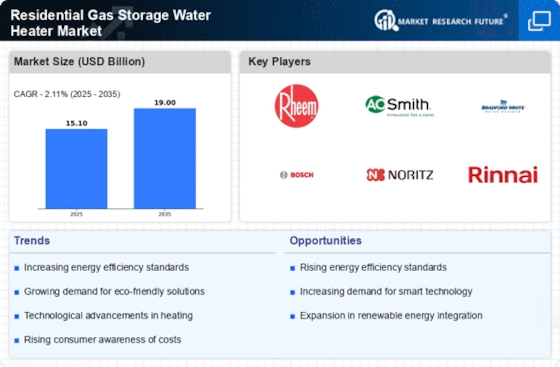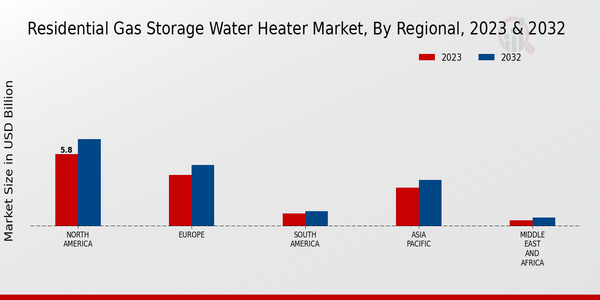Market Growth Projections
The Global Residential Gas Storage Water Heater Market Industry is poised for growth, with projections indicating a market value of 15.1 USD Billion in 2024 and an anticipated increase to 19.0 USD Billion by 2035. This growth reflects a compound annual growth rate (CAGR) of 2.11% from 2025 to 2035, driven by factors such as rising energy efficiency demands, technological advancements, and increasing construction activities. The market's expansion is indicative of a broader trend towards sustainable living and energy-efficient solutions in residential settings. As consumers continue to seek reliable and efficient water heating options, the market is likely to evolve in response to these changing preferences.
Rising Construction Activities
The Global Residential Gas Storage Water Heater Market Industry benefits significantly from the increasing construction activities in residential sectors. As urbanization accelerates, new housing developments require reliable water heating solutions, thereby boosting demand for gas storage water heaters. The construction of energy-efficient homes often incorporates these systems as standard features, aligning with consumer preferences for comfort and convenience. This trend is expected to sustain market growth, with a compound annual growth rate (CAGR) of 2.11% anticipated from 2025 to 2035. The integration of gas storage water heaters in new builds reflects a broader commitment to energy efficiency and modern living standards.
Growing Demand for Energy Efficiency
The Global Residential Gas Storage Water Heater Market Industry experiences a notable surge in demand for energy-efficient appliances. As consumers become increasingly aware of energy consumption and its environmental impact, they seek solutions that minimize energy use while maintaining performance. This trend is reflected in the projected market value of 15.1 USD Billion in 2024, as homeowners prioritize energy efficiency in their purchasing decisions. Governments worldwide are also implementing regulations that encourage the adoption of energy-efficient technologies, further driving the market. The emphasis on sustainability and reduced utility costs positions gas storage water heaters as a favorable option for many households.
Government Incentives and Regulations
Government policies and incentives play a pivotal role in shaping the Global Residential Gas Storage Water Heater Market Industry. Many governments are introducing programs that promote the adoption of energy-efficient appliances, including gas storage water heaters. These initiatives often include tax rebates, grants, and subsidies aimed at encouraging consumers to invest in more efficient technologies. Such regulatory frameworks not only stimulate market growth but also align with broader environmental goals. As these incentives become more prevalent, they are expected to drive an increase in the adoption of gas storage water heaters, further enhancing the market's growth trajectory.
Technological Advancements in Water Heating
Technological innovations play a crucial role in shaping the Global Residential Gas Storage Water Heater Market Industry. Manufacturers are continually developing advanced heating technologies that enhance efficiency and reduce operational costs. Features such as improved insulation, smart controls, and enhanced burner designs contribute to better performance and lower emissions. These advancements not only appeal to environmentally conscious consumers but also align with regulatory standards aimed at reducing carbon footprints. As a result, the market is expected to grow steadily, with a projected value of 19.0 USD Billion by 2035, indicating a strong inclination towards modern, efficient heating solutions.
Consumer Preference for Reliable Heating Solutions
Consumer preferences significantly influence the Global Residential Gas Storage Water Heater Market Industry, particularly regarding reliability and performance. Gas storage water heaters are favored for their ability to provide consistent hot water supply, which is essential for daily household activities. This reliability is particularly appealing in regions with fluctuating energy prices, where consumers seek dependable solutions. As households prioritize uninterrupted access to hot water, the market is likely to see sustained growth. The increasing awareness of the benefits of gas storage systems further solidifies their position as a preferred choice among consumers, contributing to the overall market expansion.


















Leave a Comment